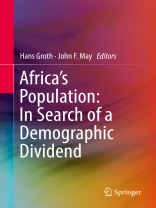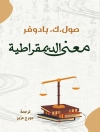This book examines the promises as well as the challenges the demographic dividend brings to sub-Saharan Africa as fertility rates in the region fall and the labor force grows. It offers a detailed analysis of what conditions must be met in order for the region to take full economic advantage of ongoing population dynamics.
As the book makes clear, the region will need to accelerate reforms to cope with its demographic transition, in particular the decline of fertility. The continent will need to foster human capital formation through renewed efforts in the areas of education, health and employment. This will entail a true vision and determination on the part of African leaders and their development partners.
The book will help readers to gain solid knowledge of the demographic trends and provide insights into socioeconomic policies that eventually might lead sub-Saharan Africa into a successful future.
Inhaltsverzeichnis
1) Introduction: Hans Groth and John F. May.- Part I: Sub-Saharan Africa’s Population: Country and Regional Case Studies: 2) Africa’s Population: History, Current Status, and Projections: Jean-Pierre Guengant.- 3) Reaping a Demographic Dividend in Africa’s Largest Country: Nigeria: Emmanuel Jimenez and Muhammad Ali Pate.- 4) The Second Biggest African Country Undergoing Rapid Change: Ethiopia: Assefa Hailemariam.- 5) The Third Biggest African Country: The Democratic Republic of the Congo: David Shapiro, Basile O. Tambashe, and Anatole Romaniuk.- 6) A Case of Almost Complete Demographic Transition: South Africa: Tom A. Moultrie.- 7) Fertility Transitions and Schooling Dividends in Sub-Saharan Africa: The Experience
of Vanguard Countries: Parfait M. Eloundou-Enyegue and Noah Hirschl.- 8) Countries with Fertility Transitions in Progress: Jean-François Kobiané and Moussa Bougma.- 9) Countries with Slow and Irregular Fertility Transitions: Gervais Beninguisse and Liliane Manitchoko.- 10) Countries with Very Slow or Incipient Fertility Transitions: Hamidou Issaka Maga and Jean-Pierre Guengant.- 11) Demographic Challenges of the Sahel Countries: John F. May, Jean-Pierre Guengant, and Vincent Barras.- Part II: Drivers of the Demographic Dividend: 12) The Demographic Dividend: A Potential Surplus Generated by a Demographic
Transition: Vincent Turbat.- 13) African Fertility Changes: Bruno Schoumaker.- 14) Access to Family Planning and Women’s Health: Ndola Prata.- 15) Manpower, Education, Skills, and Jobs in Sub-Saharan Africa: Nicolas Eberstadt.- 16) Marriage Patterns and the Demographic Dividend: Dominique Meekers and Anastasia Gage.- 17) Mortality, Health, and Aging in Sub-Saharan Africa: Bruno Masquelier and Almamy Malick Kanté.- 18) Acute and Chronic Health Challenges in Sub-Saharan Africa: An Unfinished Agenda: Thomas Zeltner, Farhad Riahi, and Jonas Huber.- 19) New and Reemerging Infectious Diseases in Sub-Saharan Africa: Alan Whiteside and Nick Zebryk.- 20) Migration, Urbanization, and Slums in Sub-Saharan Africa: Blessing Mberu, Donatien Béguy, and Alex Ezeh.- 21) Internal and International Migration: Nikola Sander and Elin Charles-Edwards.- Part III: Development Challenges: 22) Economic Growth and Public and Private Investments: Vincent Turbat.- 23) Governance, Transparency, and the Rule of Law: Anna Zuber, Christian Blickenstorfer, and Hans Groth.- 24) The Role of Natural Resources: Daniel J. Mabrey.- 25) Population, Food Security, and Climate Change: Africa’s Challenges: Jason Bremner.- 26) The Development of Organized Commodity Exchanges in Africa: An Economic Analysis: Heinz Zimmermann and Marco Haase.- Part IV: Assembling Sub-Saharan Africa’s Jigsaw: 27) Is a Rapid Fertility Decline Possible? Lessons from Asia and Emerging Countries: Feng Wang.- 28) Demographic Dividend Models: Scott Moreland and Elizabeth Leahy Madsen.- 29) The Roles of Governments, the Private Sector, and the International Community: Jotham Musinguzi.- 30) Conflicts and the Demographic Transition: Economic Opportunity or Disaster?: Siri Aas Rustad, Gudrun Østby, and Henrik Urdal.- 31) Conclusions: Hans Groth and John F. May.
Über den Autor
Hans Groth is the Chairman of the Board of the World Demographic and Ageing Forum (WDA-Forum). A medical doctor by training, he has been working with Pfizer Inc. for 24 years, until 2013. In 2003, he was appointed “Pfizer Global Health Fellow” by UNAIDS to conduct case studies in Central Asia and Siberia in order to quantify the threat potential of HIV/AIDS/TB in that region. For the past fifteen years Hans Groth has been studying the interaction between global demographic change, economic development, wealth and societal stability. Among numerous publications he is the co-editor of the reference book
Population Dynamics in Muslim Countries – Assembling the Jigsaw (Springer, 2012).
John F. May is a Visiting Scholar at the Population Reference Bureau (PRB) in Washington, D.C. and Adjunct Professor of Demography at Georgetown University. For 15 years, he was a lead demographer at the World Bank. He has worked on many population projects around the world for UNFPA, UNICEF, USAID, and IUSSP. He earned his doctorate in demography from the University of Paris-V (Sorbonne). His book World Population Policies: Their Origin, Evolution, and Impact (Springer, 2012) received the 2012 Global Media Award of the Population Institute for the best book on population. In March 2013, he was elected an Associate Member of the Belgian Academy of Sciences.












